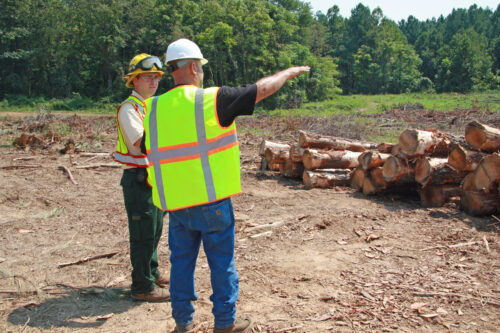
Virginia has an abundant forest resource that provides forest products for a vibrant economy, habitat for wildlife, abundant recreational opportunities, clean air, and clean water. The active management of the forest resource provides economic benefits to landowners and the economy of Virginia. Active forest management requires the engagement of the logging operator to implement management activities to achieve the landowners’ objectives to manage their forest. It is important for logging operators to understand the laws related to water quality protection, the requirement for notification, and the value that pre-harvest planning plays in operational productivity as well as environmental protection.
Virginia Department of Forestry (DOF) water quality inspectors help loggers and landowners with timber harvest planning and execution, and encourage the use of the correct site-specific voluntary best management practices (BMPs) to keep streams free of sediments.
- Pre-harvest planning
- Water quality laws
- Virginia’s Forest Products Tax
- Best management practices for water quality
- Financial assistance programs for loggers
- Get a Timber Notification ID Number
- Notify of a timber harvest
- Quarantines in Virginia
- SHARP Logger Program
- View timber sale opportunities
- Logger and Timber Harvester Directory
Your local DOF forest technician can advise about incorporating proper BMPs to protect water quality during the implementation of a forestry practice on your property. Your local DOF water quality staff can also assist with water quality law enforcement and logger financial assistance programs.
Additional Resources
| Image | Title | ID | Description | Content Type | View | hf:tax:document-category | hf:tax:Media |
|---|---|---|---|---|---|---|---|
 | Best Management Practices: Brush Matting and Vegetation – Examples | FT0041 | Forestry topic information sheet shows examples of correct best management practices – brush matting and vegetation. | Publication | View | water-quality | publication |
 | Best Management Practices: Log Landings – Examples | FT0043 | Forestry topic information sheet shows examples of correct best management practices – log landings. | Publication | View | water-quality | publication |
 | Best Management Practices: Roads and Trails – Examples | FT0046 | Forestry topic information sheet shows examples of correct best management practices – roads and trails. | Publication | View | water-quality | publication |
 | Best Management Practices: Stream Crossings – Examples | FT0042 | Forestry topic information sheet shows examples of correct best management practices – stream crossings. | Publication | View | water-quality | publication |
 | Best Management Practices: Streamside Management Zones – Examples | FT0044 | Forestry topic information sheet shows examples of correct best management practices – streamsize management zones. | Publication | View | water-quality | publication |
 | Best Management Practices: Water Bars and Rolling Dips – Examples | FT0045 | Forestry topic information sheet shows examples of correct best management practices – water bars and rolling dips. | Publication | View | water-quality | publication |
 | Logger Best Management Practice (BMP) Cost-Share Program | FT0047 | Forestry topic information sheet provides program information about the Logger Best Management Practice (BMP) Cost-Share Program providing cost-share assistance to loggers for installation of best management practices. | Publication | View | financial-assistance-water-quality water-quality | publication |
 | Logger Notification Log Book for Loggers | Log book is a booklet of timber harvest notification forms for use by loggers to keep track of their notifications. Printed copies available. | Publication | View | water-quality | publication | |
| Pine Bark Beetle Prevention Program Logger Incentive Cost-Share Application | 6.03 | Form | View | financial-assistance-forest-health forest-health | form | ||
 | Spotted Lanternfly Logger Self-Inspection Checklist – Slow the Spread!!! | FT0050 | Forestry topic information sheet provides a checklist for loggers to do a self-inspection for spotted lanternfly, including photos of what to be looking for. | Publication | View | forest-health | publication |
 | Timber Harvest Notification – Required by Law | FT0027 | Forestry topic information sheet educated logger and landowners about the timber harvest notification that is required by Virginia law. | Publication | View | water-quality | publication |
 | Timber Harvesting and Water Quality | P00132 | Brochure educates landowners and harvesters about the impact of timber harvesting on water quality and the steps required to maintain compliance with applicable laws during pre-harvest planning, harvesting and tract closeout after harvesting. Printed copies available. | Publication | View | water-quality | publication |
| Virginia’s Forestry Best Management Practices for Water Quality: Field Guide | P00134 | Technical field guide provides a convenient pocket instruction guide for timber harvesters to protect water quality when harvesting timber and comply with applicable laws. Printed copies available. | Publication | View | water-quality | publication | |
 | Virginia’s Forestry Best Management Practices for Water Quality: Technical Manual | P00104 | Technical guide (5th edition) provides detailed instruction for timber harvesters to protect water quality when harvesting timber and comply with applicable laws. Printed copies available. | Publication | View | water-quality | publication |
A variety of financial assistance programs are available through DOF and partner agencies for forest management activities to protect water quality and improve forest health.
Explore All Financial Assistance Programs
Contact Us
Your local DOF forest technician can advise about incorporating proper BMPs to protect water quality during the implementation of a forestry practice on your property. Your local DOF water quality staff can also assist with water quality law enforcement and logger financial assistance programs. Contact your local DOF staff.
For more information or questions, e-mail us or use our contact form.
